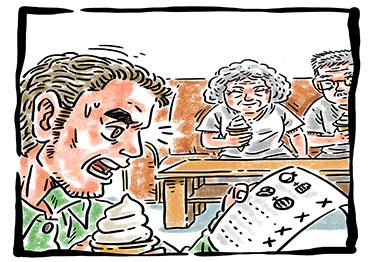As the world becomes more uncertain, people are seeking advice on how to cope.
In China, that advice often comes in the form of private, invite-only groups on the social media app WeChat.
My favorite groups are on how to deal with your Chinese in-laws. How can you stop them from opening windows in the deep of winter. How can you get your father-in-law with a loose tooth to go to the dentist?
Personally, I asked how to get my in-laws to stop eating my fancy sugar-waffle ice cream cones as cookies.
The world is changing fast, and we are constantly facing novel situations. One thing I admire my in-laws for is their certainty in the face of tremendous change. They have beliefs that will surely never change even as the world order shifts and winters disappear. For example, you need to own a house. Wind and cold are silent killers, and the reason Westerners have such high cancer rates. Beer is one of the great pleasures of life, but must be consumed warm.
One reason for the certainty of Chinese parents is their Confucian heritage, which treats elders as the transmitters of cultural wisdom and knowledge.
The traditional practice of Confucianism focuses on the idea that the ancients came up with a perfect system, and it is our obligation to study the classics and pass this wisdom down.
This stifled the advancement of science and new ideas. Partly because of this the official Confucian system with its imperial exams ended in 1905.
Attempts to break the hold of Confucianism on the general public have been disastrous and short-lived, and many of Confucianism’s concepts linger, including the core value of obeying and taking care of your parents, the grinding national college exam system, and a reverence for traditional ideas.
In a world where so much is changing so quickly, clinging to a moral code that stood the test of over 2,000 years of time can offer great comfort and stability.
But like anything you hear from the older generation, sorting out the good advice from excesses can be a challenge.
In China, parents are rarely short of advice for their children, even after they become adults.
Young Chinese women are advised not to date boys and become distracted from their studies, until suddenly they are advised to get married and have children as soon as possible.
I find the Chinese advice on healthy eating especially intriguing, since it is so detailed and passionately held.
My Chinese in-laws shake their heads every time I have a glass of ice water with dinner.
As you may know, some food is traditionally categorized as “hot,” such as beef, hot chilies and ginger. These foods will heat up your body and are advised for winter. They are also appropriate if you are reluctant to speak, get easily tired and have a pale or whitish complexion.
Other foods like watermelon and cucumber are categorized as “cold” and considered cooling in the summer. People with a reddish complexion who get easily annoyed and suffer from insomnia should eat more cooling fruits and vegetables like pears and carrots.
Advising people who don’t feel well to eat more beef or add fruit and vegetables to their diet seems like reasonable advice.
But this advice quickly descends into quackery. For example, it is advised that you should never eat barbecued lamb skewers, a late-night street food favorite across the nation, with watermelon. If you do, you will suffer decreased vigor.
Onions and honey eaten together can damage your vision.
Dog meat and green beans are flat out poison.
If you find all this confusing, handy wall charts are available to cover all the dangerous combinations. This is all obviously bogus, based on the supposed authority of elders, not real world testing.
I remember when I was 19 years old, I called my father to ask for advice on how to deal with a situation at university. He tried to improvise and answer, and I still remember the feeling of vertigo when I realized he could no longer advise me – he had never been to university.
These days, even world leaders must be confused by how to handle the seemingly endless series of crises that humanity faces. These problems are so novel that the specifics of previous generations experiences offer little guidance. Only the most general pieces of advice seem to be of any use, such as the idea of reciprocity expressed in seemingly all cultures. Confucius phrased it as, “Never impose on others what you would not choose for yourself.”
I couldn’t agree more. The best advice I got about my in-laws gobbling down my ice cream cones was, “Buy extras for them.”

 Old Version
Old Version